北师大版(2019) 必修第一册 Unit 2 Sports and Fitness Lesson 3 课件 (52张ppt)
文档属性
| 名称 | 北师大版(2019) 必修第一册 Unit 2 Sports and Fitness Lesson 3 课件 (52张ppt) | 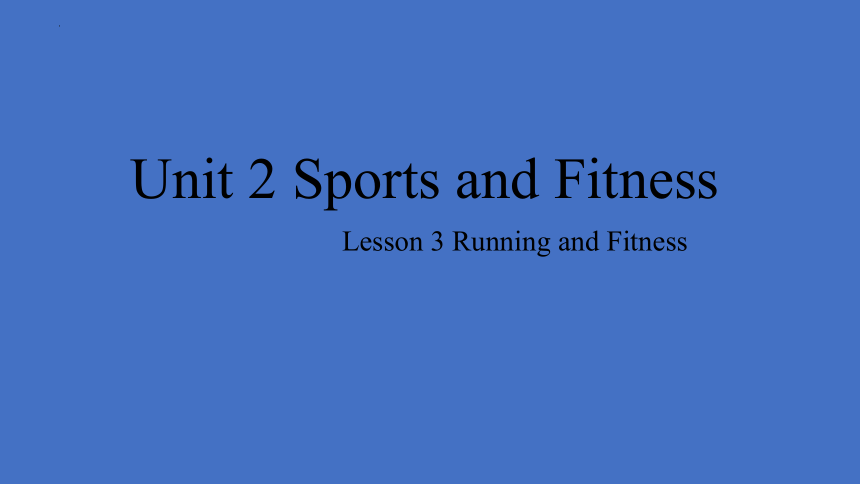 | |
| 格式 | pptx | ||
| 文件大小 | 3.9MB | ||
| 资源类型 | 教案 | ||
| 版本资源 | 北师大版(2019) | ||
| 科目 | 英语 | ||
| 更新时间 | 2022-10-18 22:26:56 | ||
图片预览

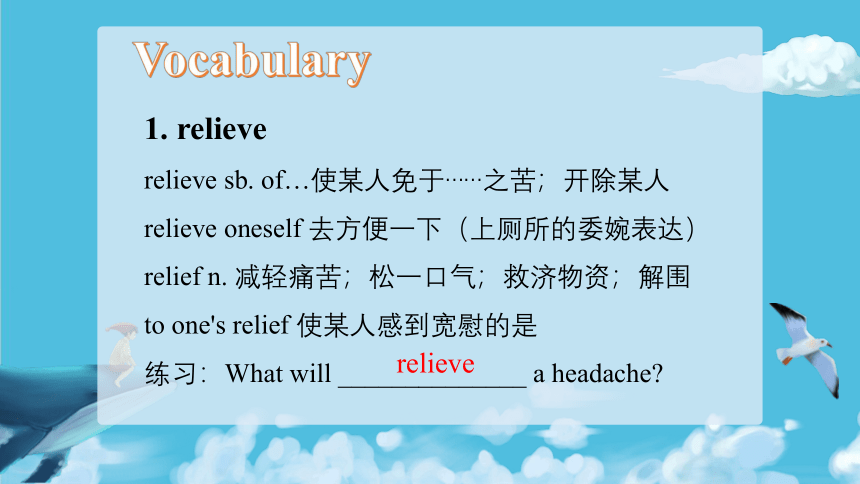
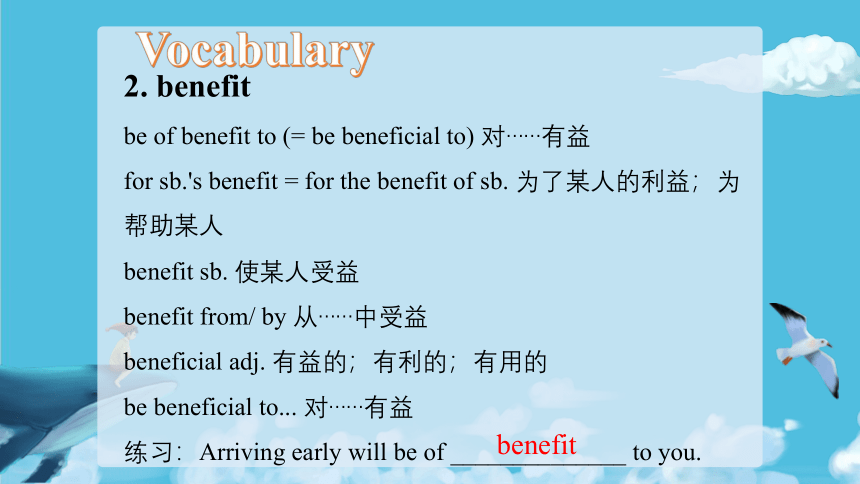
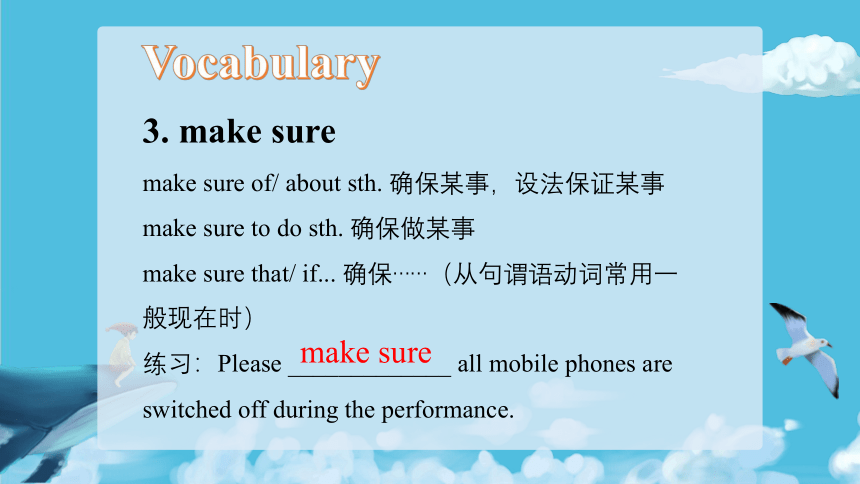
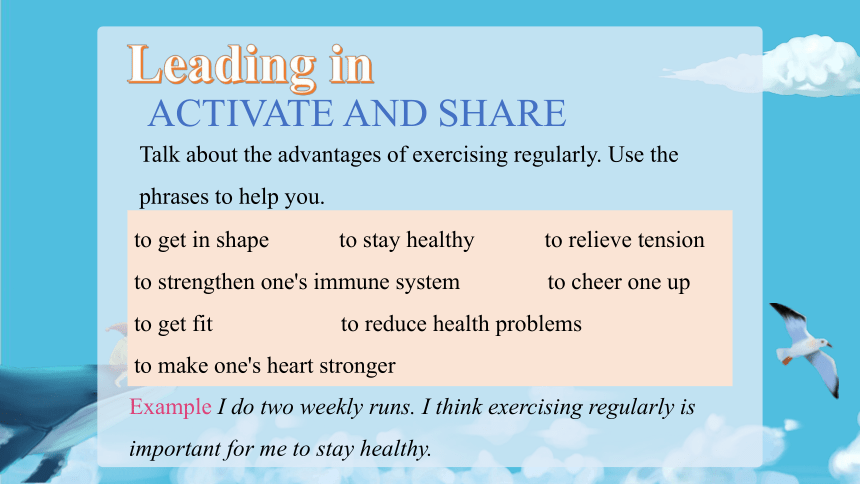
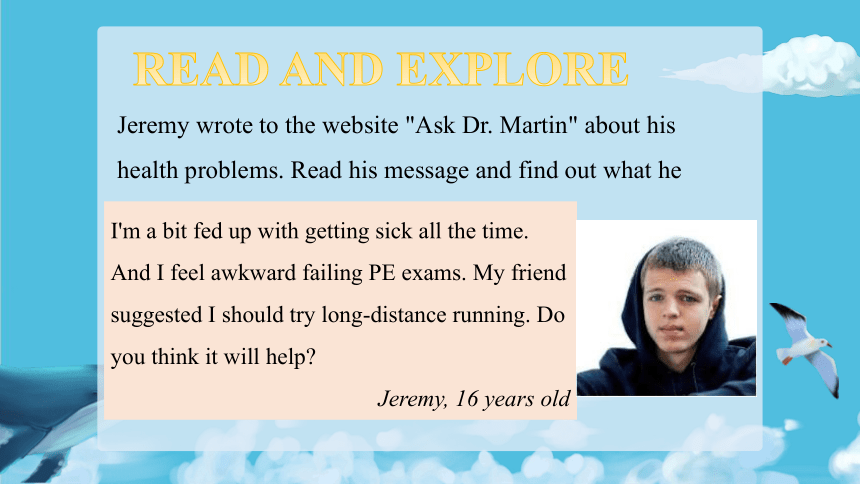
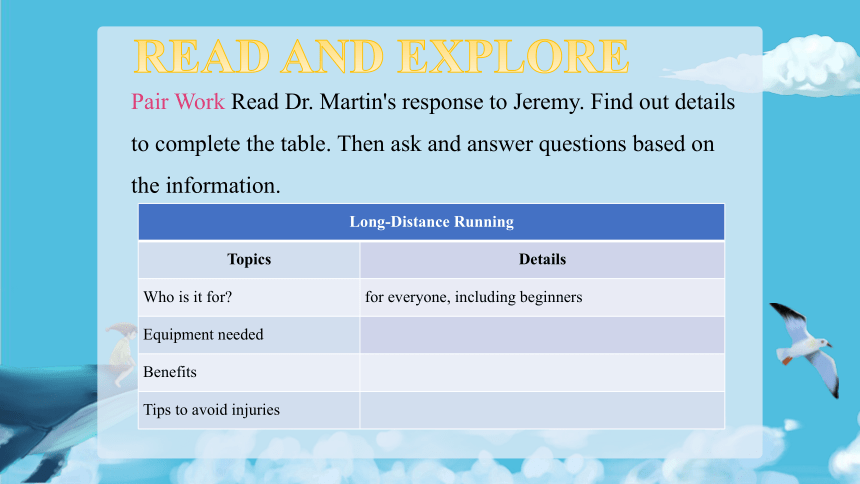
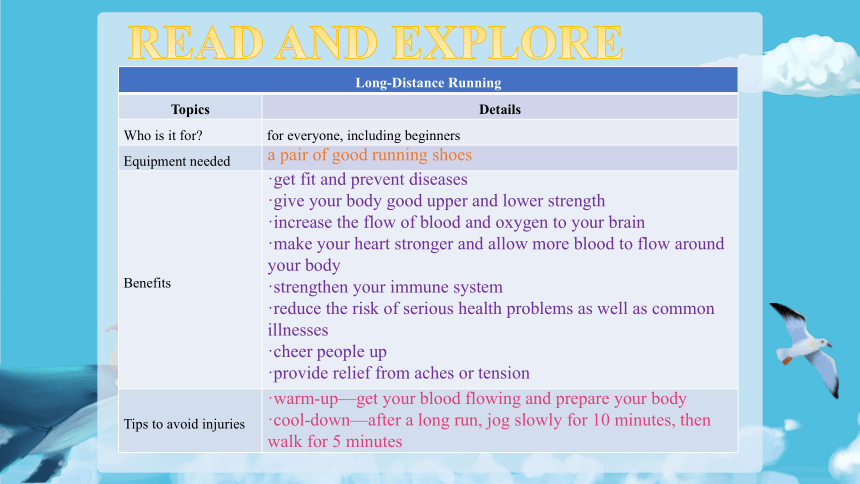
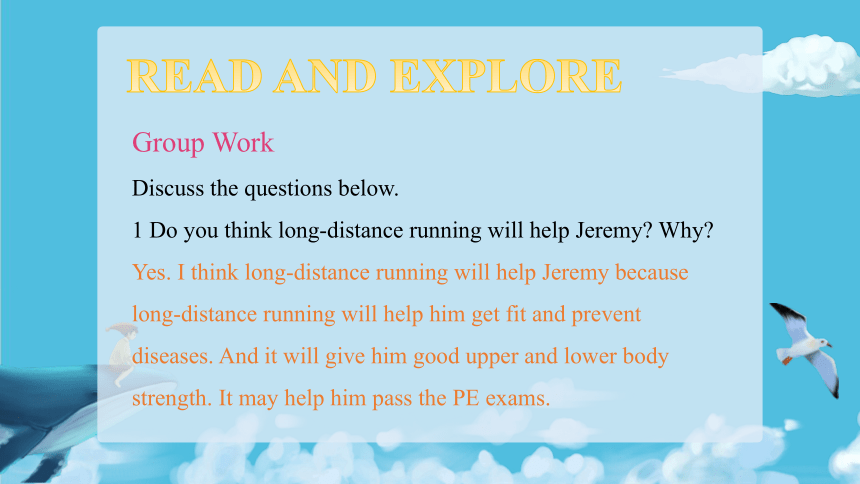
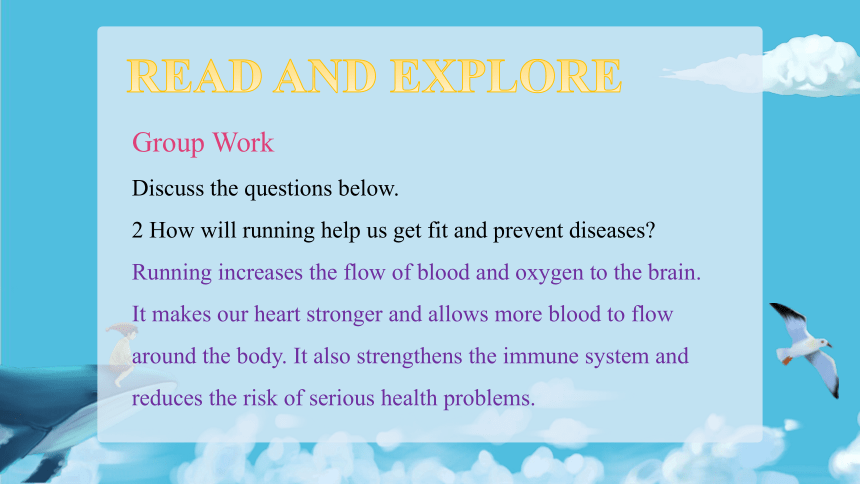
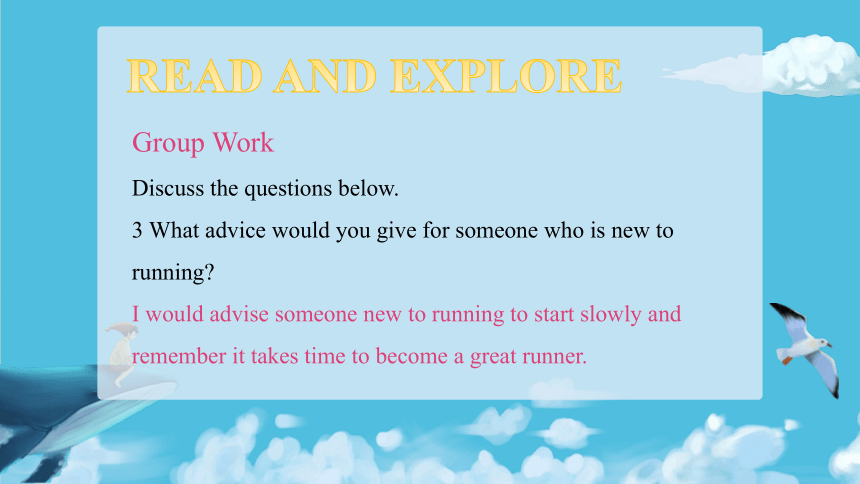
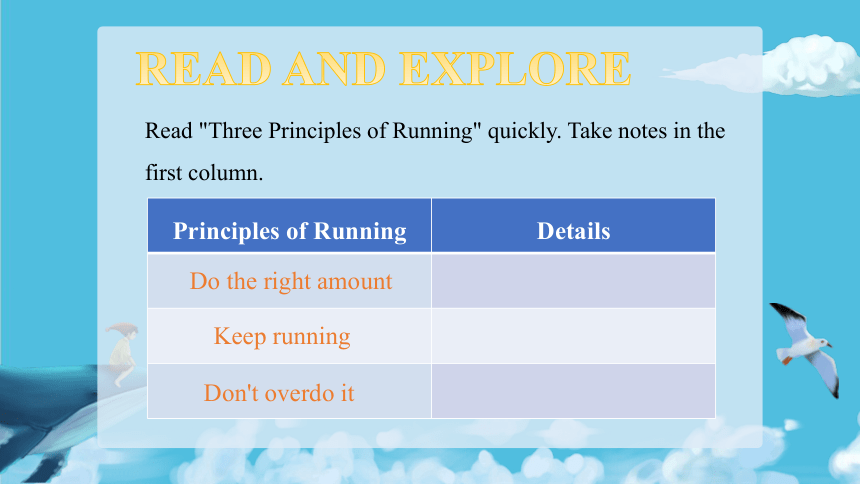
文档简介
(共52张PPT)
Unit 2 Sports and Fitness
Lesson 3 Running and Fitness
Vocabulary
1. relieve
relieve sb. of…使某人免于……之苦;开除某人
relieve oneself 去方便一下(上厕所的委婉表达)
relief n. 减轻痛苦;松一口气;救济物资;解围
to one's relief 使某人感到宽慰的是
练习:What will ______________ a headache
relieve
2. benefit
be of benefit to (= be beneficial to) 对……有益
for sb.'s benefit = for the benefit of sb. 为了某人的利益;为帮助某人
benefit sb. 使某人受益
benefit from/ by 从……中受益
beneficial adj. 有益的;有利的;有用的
be beneficial to... 对……有益
练习:Arriving early will be of ______________ to you.
benefit
Vocabulary
3. make sure
make sure of/ about sth. 确保某事,设法保证某事
make sure to do sth. 确保做某事
make sure that/ if... 确保……(从句谓语动词常用一般现在时)
练习:Please _____________ all mobile phones are switched off during the performance.
make sure
Vocabulary
Leading in
Talk about the advantages of exercising regularly. Use the phrases to help you.
ACTIVATE AND SHARE
to get in shape to stay healthy to relieve tension
to strengthen one's immune system to cheer one up to get fit to reduce health problems
to make one's heart stronger
Example I do two weekly runs. I think exercising regularly is important for me to stay healthy.
Jeremy wrote to the website "Ask Dr. Martin" about his health problems. Read his message and find out what he needs.
READ AND EXPLORE
I'm a bit fed up with getting sick all the time. And I feel awkward failing PE exams. My friend suggested I should try long-distance running. Do you think it will help
Jeremy, 16 years old
Pair Work Read Dr. Martin's response to Jeremy. Find out details to complete the table. Then ask and answer questions based on the information.
READ AND EXPLORE
Long-Distance Running
Topics Details
Who is it for for everyone, including beginners
Equipment needed
Benefits
Tips to avoid injuries
READ AND EXPLORE
Long-Distance Running
Topics Details
Who is it for for everyone, including beginners
Equipment needed
Benefits
Tips to avoid injuries
a pair of good running shoes
·get fit and prevent diseases
·give your body good upper and lower strength
·increase the flow of blood and oxygen to your brain
·make your heart stronger and allow more blood to flow around your body
·strengthen your immune system
·reduce the risk of serious health problems as well as common illnesses
·cheer people up
·provide relief from aches or tension
·warm-up—get your blood flowing and prepare your body
·cool-down—after a long run, jog slowly for 10 minutes, then walk for 5 minutes
Group Work
Discuss the questions below.
1 Do you think long-distance running will help Jeremy Why
Yes. I think long-distance running will help Jeremy because long-distance running will help him get fit and prevent diseases. And it will give him good upper and lower body strength. It may help him pass the PE exams.
READ AND EXPLORE
Group Work
Discuss the questions below.
2 How will running help us get fit and prevent diseases
Running increases the flow of blood and oxygen to the brain. It makes our heart stronger and allows more blood to flow around the body. It also strengthens the immune system and reduces the risk of serious health problems.
READ AND EXPLORE
Group Work
Discuss the questions below.
3 What advice would you give for someone who is new to running
I would advise someone new to running to start slowly and remember it takes time to become a great runner.
READ AND EXPLORE
Read "Three Principles of Running" quickly. Take notes in the first column.
READ AND EXPLORE
Principles of Running Details
Do the right amount
Keep running
Don't overdo it
Read again carefully. Complete the second column in the table in Activity 5. Then introduce "Three Principles of Running" to your partner.
READ AND EXPLORE
Principles of Running Details
Do the right amount
Keep running
Don't overdo it
Make a training plan.
Set an achievable goal. Don't do too much.
Don't give up
Take breaks
Explain the statements in your own words.
·"There is also no better way to know yourself and to see what you are capable of." (line 6, page 37)
Running is the best way to get to know yourself and your limits.
·"Running trains your mind as well as your body." (line 7, page 38)
Running makes both your mind and body stronger.
READ AND EXPLORE
Read the phrases used in the texts describing the benefits of running or the tips for keeping fit. Then put them into the correct column. Talk about the two aspects.
Benefits of running: do not need a gym membership; do not need special equipment; increase the flow of blood and oxygen to the brain; prevent diseases; give good upper and lower body strength; strengthen immune system; cheer oneself up; provide relief from aches or tension
Tips for keeping fit: draw up a training plan; do the right amount; set achievable goals; do not overdo it
READ AND EXPLORE
FOCUS ON LANGUAGE:
INDEFINITE PRONOUNS
Complete the Word Builder. Then use the words and phrases to complete the text.
I was always sick as a kid and I hated doing sports. I would rather do 1 ______________ other than exercise. If you told my childhood friends that I am now a lover of running, __________________ would believe you. But 3 ______________ in me started to change when I got into university. During my first week, I didn't know 4 _______________________ so I was alone all the time.
anything
no one/ nobody
something
anyone/ anybody
FOCUS ON LANGUAGE:
INDEFINITE PRONOUNS
Complete the Word Builder. Then use the words and phrases to complete the text.
That's when I realised that running is a great way to make friends and kill time when you're alone, and there's 5 ______________ better than a good run to clear your head when things get stressful. It's never too late to start getting into running and exercising – after all, as the saying goes, "6 ______________ is possible!"
nothing
Everything
FOCUS ON LANGUAGE:
INDEFINITE PRONOUNS
Indefinite Pronouns
Things People
some something
any
no
every
someone/ somebody
anything
anyone/ anybody
nothing
no one/ nobody
everything
everyone/ everybody
EXPRESS YOURSELF
Prepare to give a 3-minute presentation, introducing the benefits of running and advice for doing it properly.
EXPRESS YOURSELF
Search online to find out how much exercise teenagers should have in a week. What exercises are good for senior secondary students Share in class.
不定代词主要有:all, each, every, both, either, neither, one, none, little, few, many, much, other, another, some, any, no等。还有由some, any, no, every和one, body, thing等构成的合成代词。不定代词具有名词和形容词的性质,并有可数和不可数之分,在句中可以作主语、表语、宾语、同位语、定语、状语等(every,no只能作定语)。
语法:不定代词
1. some与any
(1)一般用法:
some, any可与单、复数可数名词及不可数名词连用。some一般用于肯定句,any多用于疑问句、否定句或条件句。
语法:不定代词
1. some与any
(2)特殊用法:
① any用于肯定句表示“任何”。
Any child can do that. (定语)
You may take any of them. (宾语)
语法:不定代词
1. some与any
(2)特殊用法:
② some 修饰名词,表示“一些”,用于肯定句中。
Some positions require students to be 15 to 24 or up to 29 for persons with a disability.
语法:不定代词
1. some与any
(2)特殊用法:
③ 在期待对方回答yes时,some用在表示请求或邀请的问句中。
Mum, could you give me some money (请求)
Would you like some bananas (邀请)
语法:不定代词
1. some与any
(2)特殊用法:
④ some用于否定句表示部分否定。
I don't know some of the students.(宾语)
语法:不定代词
1. some与any
(2)特殊用法:
⑤ some 和any 还有副词的词性,在句中可作状语。some意为“大约”,相当于about;而any则表示程度,意为“稍微,丝毫”。
There are some 300 workers on strike. Do you feel any better today
语法:不定代词
2. one, both 与all
(1)one作定语、表语、主语或宾语,可以指人或物,表示“一个”,其复数为ones;指人时,其所有格是one's,反身代词是oneself。
One should try one's best to serve the people. This is not the one I want.
语法:不定代词
2. one, both 与all
(2)one, ones可以代替上文提到过的名词,以免重复。one, ones分别可以用this, that; these, those或the, which等词修饰。
Here are three pens. Which one is yours, this one or that one or the one in the pencil case
These books are more interesting than those ones.
语法:不定代词
2. one, both 与all
(3)both用作定语、宾语、主语和同位语,可以指人或指物,表示“两者都”。
both 用于否定句时,表示部分否定;表示完全否定时,用 neither。
Both of us are not teachers. (部分否定)
Neither of us is a teacher.(完全否定)
语法:不定代词
2. one, both 与all
(3)both用作定语、宾语、主语和同位语,可以指人或指物,表示“两者都”。
both不能放在the, these, those, my等词之后,而应放在它们的前面。
Both my parents like this film. Both the boys are tall.
语法:不定代词
2. one, both 与all
(4)all用作主语、表语、宾语、定语或同位语,指“全部的;整个的”,可与可数名词或不可数名词连用;除少数情况外,一般不与单数可数名词连用;与复数可数名词连用时,表示“所有的,全部的”,指三个或三个以上的人或物。
语法:不定代词
2. one, both 与all
注意:
all用于否定句时,表示部分否定;表示完全否定用none。
Not all the ants go out for food.(部分否定)
None of the money is mine.(完全否定)
语法:不定代词
3. it/ one/ that/ those
(1)it特指上文提到的那个事物,替代单数可数名词或不可数名词
He bought a book and lent it to me.
他买了一本书,并把它借给了我。
语法:不定代词
3. it/ one/ that/ those
(2)one泛指与上文提到的同类的事物中的一个,替代单数可数名词;若是替代复数可数名词则用ones
Its color is blue; I want a red one.
它的颜色是蓝色的,我想要一个红色的。
语法:不定代词
3. it/ one/ that/ those
(3)that特指与上文提到的同类事物的另一事物,用于替代不可数名词或单数可数名词
The weather here is colder than that in China.
这儿的天气比中国的天气冷。
语法:不定代词
3. it/ one/ that/ those
(4)those特指与上文提到的同类人/ 事物的另一些人/ 事物,用于替代复数可数名词
These books are better than those on the shelf.
这些书比书架上的那些书更好。
语法:不定代词
4. many和much
many 和much都表示“许多”,但many修饰或代替复数可数名词,much修饰或代替不可数名词。它们在句中可作主语、宾语和定语。much有时用作状语。
语法:不定代词
5. few, little, a few 和 a little
few和little表示“没有多少”,含否定意义;而a few和a little表示“有一些,有几个”,含肯定意义。另外,few和a few 修饰可数名词;little和a little修饰不可数名词。它们在句中常用作定语、主语和宾语。
语法:不定代词
6. no和none
no = not any,表示“没有”,用来修饰可数名词或不可数名词,通常作定语。none代替不可数名词作主语时,谓语动词用单数形式;代替可数名词作主语时,谓语动词可用单数形式也可用复数形式。none还可以在句中作宾语。none既可以指人又可以指物,no one只能指人。
语法:不定代词
7. each和every
each(各个)指两个或两个以上的人或物,侧重个体,在句中作主语、宾语、定语或同位语;every(每个)指三个或三个以上的人或物,侧重整体,在句中只能作定语。
语法:不定代词
7. each和every
Each of them has been there. (主语)
The teacher gave each of the students a new textbook.(宾语)
We each got a ticket.(同位语)
语法:不定代词
7. each和every
Each student in our class has a dictionary.
(定语,强调每个个体)
Every student in our class has a dictionary.
(定语,强调班上“所有的人”)
语法:不定代词
8. either和neither
either是“两者中任何一个”的意思,可修饰或代替单数可数名词;neither是“两者中没有一个”的意思,可以修饰或代替单数可数名词,它们可在句中作主语、宾语或定语。
Here are two pens. You may take either of them.(宾语)
Neither boy knows French.(定语)
语法:不定代词
8. either和neither
① either用作副词,意为“也”,用于否定句的句末。
He doesn't like tea, and I don't either.
② either 与or 连用,意为“不是……就是……”或“要么……要么……”。
He is either Japanese or Chinese.
语法:不定代词
8. either和neither
③ neither用作副词,意为“也不”,即“not…either”。
He can't do it. Neither can I.
④ neither可与nor连用,意为“既不……也不……”。
Neither he nor you are a student.
语法:不定代词
9. the other和another, the others 和others
(1)the other表示“两者中的另一个”;“the other+复数可数名词”及the others表示“其他的全部人或物”。others 及“other +复数可数名词”泛指“其他的/ 别的人或物”。这些词语在句中可作主语、宾语或定语。
语法:不定代词
9. the other和another, the others 和others
He got two books; one is a textbook, and the other is a novel.
Five of the pencils are red; the others/ the other pens are yellow.
Some are singing; others are dancing.
语法:不定代词
9. the other和another, the others 和others
(2)another 修饰或代替单数可数名词,意为“(三者或三者以上的)另一个”,不能指两者中的另一个,在句中可作宾语和定语。
This coat is too dark. Please show me another.(宾语)
Please give me another book.(定语)
语法:不定代词
9. the other和another, the others 和others
注意:
another修饰复数可数名词时,意为“再,又”。
Please give me another ten minutes.
= Please give me ten more minutes.
语法:不定代词
练习
1. Jack and Tom are good friends and ____________ are in the same class.
2. When living overseas in a place where people speak a different language, ____________ can be difficult to make yourself understood.
3. The cost of renting a house in central Xi'an is higher than ____________ in any other area of the city.
4. To stay awake, he finished a cup of coffee and ordered ____________.
both
it
that
another
练习
5. Larry asks Bill and Peter to go on a picnic with him, but ____________ of them wants to, because they have work to do.
6. I got this bicycle for ____________. My friend gave it to me when she bought a new one.
7. Dad lost his job, and as Mom explained, "He was lucky to find ____________ one."
8. Mother's Day is coming. I'm sorry that I am abroad and can't send ____________ (your) flowers.
neither
nothing
another
you
Unit 2 Sports and Fitness
Lesson 3 Running and Fitness
Vocabulary
1. relieve
relieve sb. of…使某人免于……之苦;开除某人
relieve oneself 去方便一下(上厕所的委婉表达)
relief n. 减轻痛苦;松一口气;救济物资;解围
to one's relief 使某人感到宽慰的是
练习:What will ______________ a headache
relieve
2. benefit
be of benefit to (= be beneficial to) 对……有益
for sb.'s benefit = for the benefit of sb. 为了某人的利益;为帮助某人
benefit sb. 使某人受益
benefit from/ by 从……中受益
beneficial adj. 有益的;有利的;有用的
be beneficial to... 对……有益
练习:Arriving early will be of ______________ to you.
benefit
Vocabulary
3. make sure
make sure of/ about sth. 确保某事,设法保证某事
make sure to do sth. 确保做某事
make sure that/ if... 确保……(从句谓语动词常用一般现在时)
练习:Please _____________ all mobile phones are switched off during the performance.
make sure
Vocabulary
Leading in
Talk about the advantages of exercising regularly. Use the phrases to help you.
ACTIVATE AND SHARE
to get in shape to stay healthy to relieve tension
to strengthen one's immune system to cheer one up to get fit to reduce health problems
to make one's heart stronger
Example I do two weekly runs. I think exercising regularly is important for me to stay healthy.
Jeremy wrote to the website "Ask Dr. Martin" about his health problems. Read his message and find out what he needs.
READ AND EXPLORE
I'm a bit fed up with getting sick all the time. And I feel awkward failing PE exams. My friend suggested I should try long-distance running. Do you think it will help
Jeremy, 16 years old
Pair Work Read Dr. Martin's response to Jeremy. Find out details to complete the table. Then ask and answer questions based on the information.
READ AND EXPLORE
Long-Distance Running
Topics Details
Who is it for for everyone, including beginners
Equipment needed
Benefits
Tips to avoid injuries
READ AND EXPLORE
Long-Distance Running
Topics Details
Who is it for for everyone, including beginners
Equipment needed
Benefits
Tips to avoid injuries
a pair of good running shoes
·get fit and prevent diseases
·give your body good upper and lower strength
·increase the flow of blood and oxygen to your brain
·make your heart stronger and allow more blood to flow around your body
·strengthen your immune system
·reduce the risk of serious health problems as well as common illnesses
·cheer people up
·provide relief from aches or tension
·warm-up—get your blood flowing and prepare your body
·cool-down—after a long run, jog slowly for 10 minutes, then walk for 5 minutes
Group Work
Discuss the questions below.
1 Do you think long-distance running will help Jeremy Why
Yes. I think long-distance running will help Jeremy because long-distance running will help him get fit and prevent diseases. And it will give him good upper and lower body strength. It may help him pass the PE exams.
READ AND EXPLORE
Group Work
Discuss the questions below.
2 How will running help us get fit and prevent diseases
Running increases the flow of blood and oxygen to the brain. It makes our heart stronger and allows more blood to flow around the body. It also strengthens the immune system and reduces the risk of serious health problems.
READ AND EXPLORE
Group Work
Discuss the questions below.
3 What advice would you give for someone who is new to running
I would advise someone new to running to start slowly and remember it takes time to become a great runner.
READ AND EXPLORE
Read "Three Principles of Running" quickly. Take notes in the first column.
READ AND EXPLORE
Principles of Running Details
Do the right amount
Keep running
Don't overdo it
Read again carefully. Complete the second column in the table in Activity 5. Then introduce "Three Principles of Running" to your partner.
READ AND EXPLORE
Principles of Running Details
Do the right amount
Keep running
Don't overdo it
Make a training plan.
Set an achievable goal. Don't do too much.
Don't give up
Take breaks
Explain the statements in your own words.
·"There is also no better way to know yourself and to see what you are capable of." (line 6, page 37)
Running is the best way to get to know yourself and your limits.
·"Running trains your mind as well as your body." (line 7, page 38)
Running makes both your mind and body stronger.
READ AND EXPLORE
Read the phrases used in the texts describing the benefits of running or the tips for keeping fit. Then put them into the correct column. Talk about the two aspects.
Benefits of running: do not need a gym membership; do not need special equipment; increase the flow of blood and oxygen to the brain; prevent diseases; give good upper and lower body strength; strengthen immune system; cheer oneself up; provide relief from aches or tension
Tips for keeping fit: draw up a training plan; do the right amount; set achievable goals; do not overdo it
READ AND EXPLORE
FOCUS ON LANGUAGE:
INDEFINITE PRONOUNS
Complete the Word Builder. Then use the words and phrases to complete the text.
I was always sick as a kid and I hated doing sports. I would rather do 1 ______________ other than exercise. If you told my childhood friends that I am now a lover of running, __________________ would believe you. But 3 ______________ in me started to change when I got into university. During my first week, I didn't know 4 _______________________ so I was alone all the time.
anything
no one/ nobody
something
anyone/ anybody
FOCUS ON LANGUAGE:
INDEFINITE PRONOUNS
Complete the Word Builder. Then use the words and phrases to complete the text.
That's when I realised that running is a great way to make friends and kill time when you're alone, and there's 5 ______________ better than a good run to clear your head when things get stressful. It's never too late to start getting into running and exercising – after all, as the saying goes, "6 ______________ is possible!"
nothing
Everything
FOCUS ON LANGUAGE:
INDEFINITE PRONOUNS
Indefinite Pronouns
Things People
some something
any
no
every
someone/ somebody
anything
anyone/ anybody
nothing
no one/ nobody
everything
everyone/ everybody
EXPRESS YOURSELF
Prepare to give a 3-minute presentation, introducing the benefits of running and advice for doing it properly.
EXPRESS YOURSELF
Search online to find out how much exercise teenagers should have in a week. What exercises are good for senior secondary students Share in class.
不定代词主要有:all, each, every, both, either, neither, one, none, little, few, many, much, other, another, some, any, no等。还有由some, any, no, every和one, body, thing等构成的合成代词。不定代词具有名词和形容词的性质,并有可数和不可数之分,在句中可以作主语、表语、宾语、同位语、定语、状语等(every,no只能作定语)。
语法:不定代词
1. some与any
(1)一般用法:
some, any可与单、复数可数名词及不可数名词连用。some一般用于肯定句,any多用于疑问句、否定句或条件句。
语法:不定代词
1. some与any
(2)特殊用法:
① any用于肯定句表示“任何”。
Any child can do that. (定语)
You may take any of them. (宾语)
语法:不定代词
1. some与any
(2)特殊用法:
② some 修饰名词,表示“一些”,用于肯定句中。
Some positions require students to be 15 to 24 or up to 29 for persons with a disability.
语法:不定代词
1. some与any
(2)特殊用法:
③ 在期待对方回答yes时,some用在表示请求或邀请的问句中。
Mum, could you give me some money (请求)
Would you like some bananas (邀请)
语法:不定代词
1. some与any
(2)特殊用法:
④ some用于否定句表示部分否定。
I don't know some of the students.(宾语)
语法:不定代词
1. some与any
(2)特殊用法:
⑤ some 和any 还有副词的词性,在句中可作状语。some意为“大约”,相当于about;而any则表示程度,意为“稍微,丝毫”。
There are some 300 workers on strike. Do you feel any better today
语法:不定代词
2. one, both 与all
(1)one作定语、表语、主语或宾语,可以指人或物,表示“一个”,其复数为ones;指人时,其所有格是one's,反身代词是oneself。
One should try one's best to serve the people. This is not the one I want.
语法:不定代词
2. one, both 与all
(2)one, ones可以代替上文提到过的名词,以免重复。one, ones分别可以用this, that; these, those或the, which等词修饰。
Here are three pens. Which one is yours, this one or that one or the one in the pencil case
These books are more interesting than those ones.
语法:不定代词
2. one, both 与all
(3)both用作定语、宾语、主语和同位语,可以指人或指物,表示“两者都”。
both 用于否定句时,表示部分否定;表示完全否定时,用 neither。
Both of us are not teachers. (部分否定)
Neither of us is a teacher.(完全否定)
语法:不定代词
2. one, both 与all
(3)both用作定语、宾语、主语和同位语,可以指人或指物,表示“两者都”。
both不能放在the, these, those, my等词之后,而应放在它们的前面。
Both my parents like this film. Both the boys are tall.
语法:不定代词
2. one, both 与all
(4)all用作主语、表语、宾语、定语或同位语,指“全部的;整个的”,可与可数名词或不可数名词连用;除少数情况外,一般不与单数可数名词连用;与复数可数名词连用时,表示“所有的,全部的”,指三个或三个以上的人或物。
语法:不定代词
2. one, both 与all
注意:
all用于否定句时,表示部分否定;表示完全否定用none。
Not all the ants go out for food.(部分否定)
None of the money is mine.(完全否定)
语法:不定代词
3. it/ one/ that/ those
(1)it特指上文提到的那个事物,替代单数可数名词或不可数名词
He bought a book and lent it to me.
他买了一本书,并把它借给了我。
语法:不定代词
3. it/ one/ that/ those
(2)one泛指与上文提到的同类的事物中的一个,替代单数可数名词;若是替代复数可数名词则用ones
Its color is blue; I want a red one.
它的颜色是蓝色的,我想要一个红色的。
语法:不定代词
3. it/ one/ that/ those
(3)that特指与上文提到的同类事物的另一事物,用于替代不可数名词或单数可数名词
The weather here is colder than that in China.
这儿的天气比中国的天气冷。
语法:不定代词
3. it/ one/ that/ those
(4)those特指与上文提到的同类人/ 事物的另一些人/ 事物,用于替代复数可数名词
These books are better than those on the shelf.
这些书比书架上的那些书更好。
语法:不定代词
4. many和much
many 和much都表示“许多”,但many修饰或代替复数可数名词,much修饰或代替不可数名词。它们在句中可作主语、宾语和定语。much有时用作状语。
语法:不定代词
5. few, little, a few 和 a little
few和little表示“没有多少”,含否定意义;而a few和a little表示“有一些,有几个”,含肯定意义。另外,few和a few 修饰可数名词;little和a little修饰不可数名词。它们在句中常用作定语、主语和宾语。
语法:不定代词
6. no和none
no = not any,表示“没有”,用来修饰可数名词或不可数名词,通常作定语。none代替不可数名词作主语时,谓语动词用单数形式;代替可数名词作主语时,谓语动词可用单数形式也可用复数形式。none还可以在句中作宾语。none既可以指人又可以指物,no one只能指人。
语法:不定代词
7. each和every
each(各个)指两个或两个以上的人或物,侧重个体,在句中作主语、宾语、定语或同位语;every(每个)指三个或三个以上的人或物,侧重整体,在句中只能作定语。
语法:不定代词
7. each和every
Each of them has been there. (主语)
The teacher gave each of the students a new textbook.(宾语)
We each got a ticket.(同位语)
语法:不定代词
7. each和every
Each student in our class has a dictionary.
(定语,强调每个个体)
Every student in our class has a dictionary.
(定语,强调班上“所有的人”)
语法:不定代词
8. either和neither
either是“两者中任何一个”的意思,可修饰或代替单数可数名词;neither是“两者中没有一个”的意思,可以修饰或代替单数可数名词,它们可在句中作主语、宾语或定语。
Here are two pens. You may take either of them.(宾语)
Neither boy knows French.(定语)
语法:不定代词
8. either和neither
① either用作副词,意为“也”,用于否定句的句末。
He doesn't like tea, and I don't either.
② either 与or 连用,意为“不是……就是……”或“要么……要么……”。
He is either Japanese or Chinese.
语法:不定代词
8. either和neither
③ neither用作副词,意为“也不”,即“not…either”。
He can't do it. Neither can I.
④ neither可与nor连用,意为“既不……也不……”。
Neither he nor you are a student.
语法:不定代词
9. the other和another, the others 和others
(1)the other表示“两者中的另一个”;“the other+复数可数名词”及the others表示“其他的全部人或物”。others 及“other +复数可数名词”泛指“其他的/ 别的人或物”。这些词语在句中可作主语、宾语或定语。
语法:不定代词
9. the other和another, the others 和others
He got two books; one is a textbook, and the other is a novel.
Five of the pencils are red; the others/ the other pens are yellow.
Some are singing; others are dancing.
语法:不定代词
9. the other和another, the others 和others
(2)another 修饰或代替单数可数名词,意为“(三者或三者以上的)另一个”,不能指两者中的另一个,在句中可作宾语和定语。
This coat is too dark. Please show me another.(宾语)
Please give me another book.(定语)
语法:不定代词
9. the other和another, the others 和others
注意:
another修饰复数可数名词时,意为“再,又”。
Please give me another ten minutes.
= Please give me ten more minutes.
语法:不定代词
练习
1. Jack and Tom are good friends and ____________ are in the same class.
2. When living overseas in a place where people speak a different language, ____________ can be difficult to make yourself understood.
3. The cost of renting a house in central Xi'an is higher than ____________ in any other area of the city.
4. To stay awake, he finished a cup of coffee and ordered ____________.
both
it
that
another
练习
5. Larry asks Bill and Peter to go on a picnic with him, but ____________ of them wants to, because they have work to do.
6. I got this bicycle for ____________. My friend gave it to me when she bought a new one.
7. Dad lost his job, and as Mom explained, "He was lucky to find ____________ one."
8. Mother's Day is coming. I'm sorry that I am abroad and can't send ____________ (your) flowers.
neither
nothing
another
you
同课章节目录
- Unit 1 Life Choices
- Lesson 1 Lifestyles
- Lesson 2 Understanding and Coping with Stress
- Lesson 3 Your Life Is What You Make It
- Unit 2 Sports and Fitness
- Lesson 1 The Underdog
- Lesson 2 Rules of the Game
- Lesson 3 Running and Fitness
- Unit 3 Celebrations
- Lesson 1 Spring Festival
- Lesson 2 Special Occasions
- Lesson 3 Memories of Christmas
